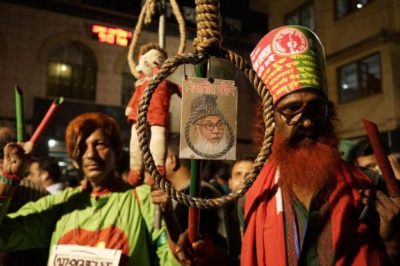By
Sheuli Akter
Bangladesh has executed the largest Islamist party chief for committing crimes against humanity during the country’s liberation in 1971.
Jahangir Kabir, a Dhaka Jail official, told journalists that “The war criminal was hanged at 12:10 a.m. (local time Wednesday) after completion of all legal procedures.”
Motiur Rahman Nizami, ameer (president) of Bangladesh Jamaat-e-Islami party, was hanged in jail in the capital Dhaka hours after chosing not to seek a presidential pardon.
Before his execution his family members walked in to meet him for the last time at the jail in Dhaka on Tuesday night at about 8:00 pm local time.
Bangladesh’s apex court on May 5 dismissed the final review petition of the war crimes death row inmate paving the way for his execution.
Earlier in October, 2014 a special tribunal awarded death sentence to Nizami who was a a cabinet member in the government of former Prime Minister Khaleda Zia in 2001-2006.
About an hour after the execution, an ambulance carrying Nizami’s body left the jail for his home village in Pabna district, some 216 km west of capital Dhaka.
Nizami was convicted of abduction, torture and mass murder as one of the key leader of a pro-Pakistan militia.
Nizami was indicted in 2012 with 16 charges of crimes against humanity, including looting, mass killings, arson, rape and forcefully converting people to Muslim during the 1971 war.
The indictment order said Nizami was a key organizer of the Al-Badr, an auxiliary force of the then Pakistani army which planned and executed the killing of Bengali intellectuals at the end of the war.
Earlier, Ali Ahsan Mohammad Mojaheed, secretary general of Bangladesh Jamaat, and Salauddin Quader Chowdhury, a leader of the Bangladesh Nationalist Party, BNP, were hanged in jail in the capital Dhaka in November last year hours after President Abdul Hamid rejected their mercy pleas.
Muhammad Kamaruzzaman, also a leader of Bangladesh Jamaat, was executed in April last year for crimes against humanity committed during the country’s war of independence in 1971.
Another Jamaat leader, Abdul Quader Molla, also convicted of war crimes, was executed on Dec. 12, 2013.
Both BNP and Jamaat have dismissed the tribunals as a government “show trial” and said they are domestic set-ups without the oversight or involvement of the United Nations.
But the ruling party says the tribunals met proper standards.
Almost 40 years after the 1971 fight for independence from Pakistan, Prime Minister Sheikh Hasina, the daughter of Bangladesh’s independence hero Sheikh Mujibur Rahman, established the first tribunal in March 2010.
Hasina’s government says about 3 million people were killed in the nine month war. Bangladesh was called East Pakistan until 1971.



No Comments Yet!
You can be first to comment this post!